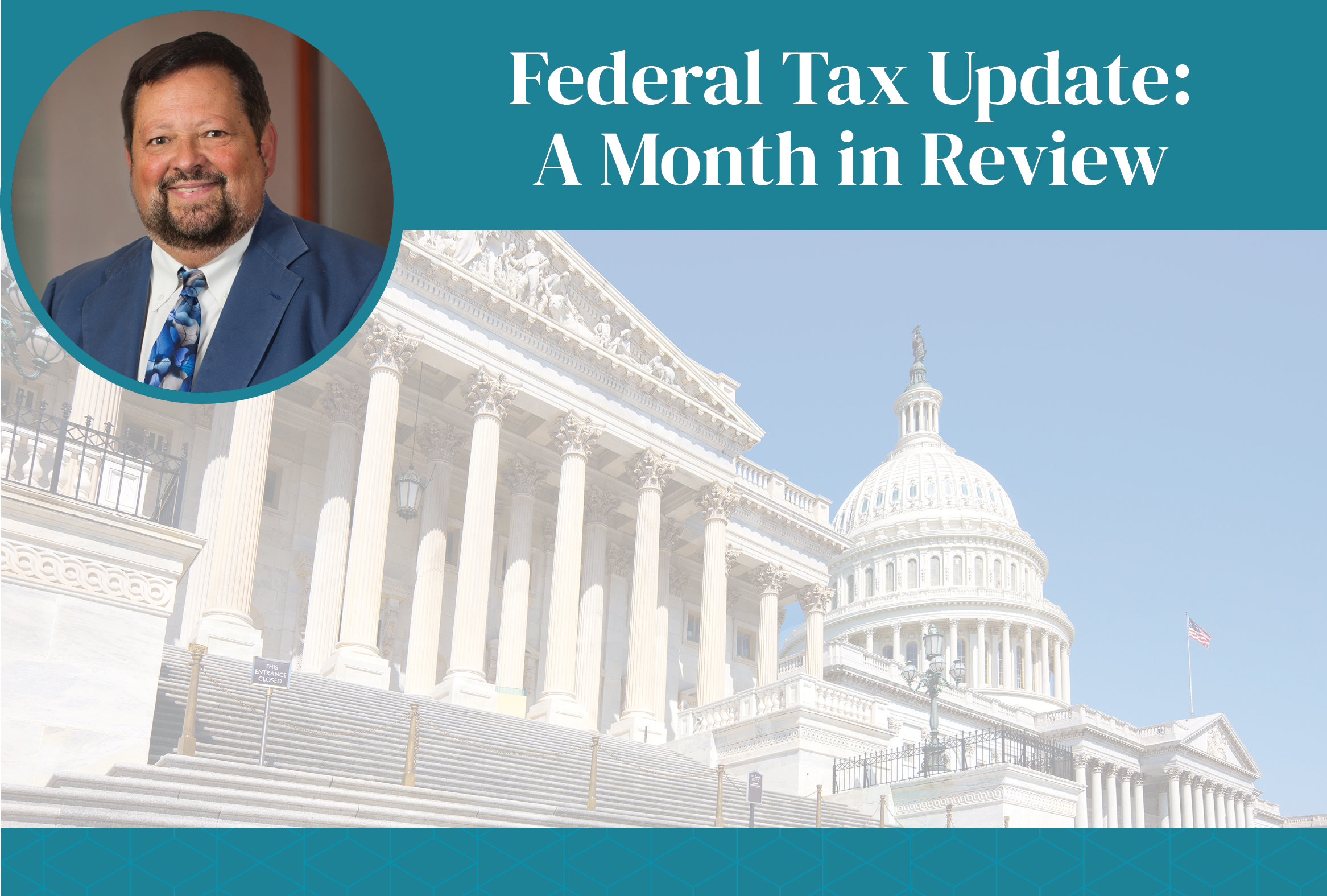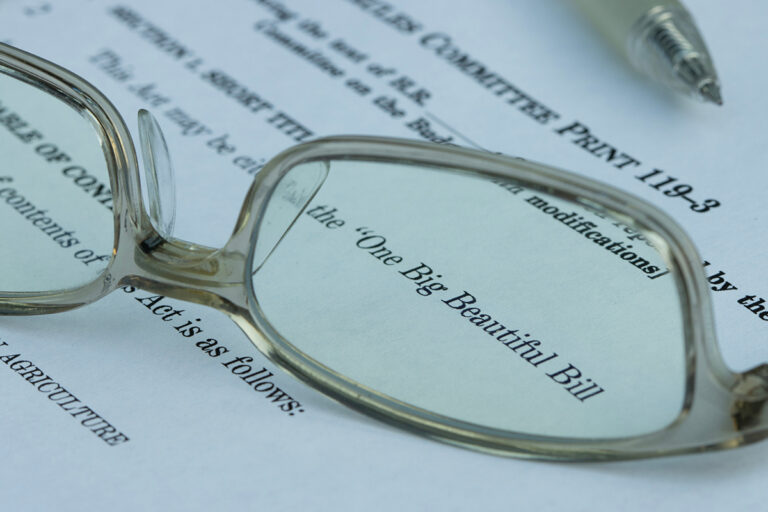April 1st, 2024
March Federal Tax Updates
Posted in: Tax Law Tagged: David S. De Jong

INDIVIDUALS
In State of New Jersey v. Mnuchin, 133 AFTR2d 2024-________, a New York Federal District Court upheld an IRS Regulation nixing a “workaround” to the $10,000 state and local tax deduction maximum; the method would have allowed donations to state charities in lieu of state tax obligations.
In Valley Park Ranch, LLC v. Commissioner, 162 TC No. 6, a divided Tax Court effectively reversed a four-year old decision and, agreeing with the Eleventh Circuit Court of Appeals and in opposition to the Sixth Circuit, invalidated an IRS regulation on a procedural issue of failing to respond to a “significant comment” and threw out a denial of a $14.8 million deduction for a conservation easement where the deed reserved the value of post-donation property improvements to the donor by subtracting the value of those improvements from the proceeds the parties would receive in the event that the easement were extinguished.
In Savannah Shoals LLC v. Commissioner, TC Memo 2024-35, the Tax Court concluded that a conservation easement was worth $480,000 and not the $23 million claimed by a partnership, finding that sales projections were overly optimistic in light of the fact that competing quarries were in better locations; the Court imposed a 40 percent penalty on underpayment.
RETIREMENT AND ESTATE PLANNING
Proposed Regulations under Code Section 6011 would make certain transactions involving the use of the Charitable Remainder Annuity Trust (CRAT) and a single premium annuity a “listed transaction.”
BUSINESS
In Midwest Medical Aesthetics Center v. Commissioner, TC Memo 2024-32, the Tax Court disallowed numerous expenses claimed by a corporation causing constructive dividends to the owner related to lack of substantiation; the Court imposed the civil fraud penalty on the stockholder who had previously gone to jail for tax evasion.
In Chappell v. Commissioner, TC Summary Opinion 2024-2, the Tax Court disallowed a claim for actual automobile expenses because of failure to meet the strict substantiation rules but allowed a deduction at the standard mileage rates based on mileage logs but only to the extent that the business purpose was self-evident; in Steward v. Commissioner, TC Summary Opinion 2024-3, the Tax Court allowed a musician whose contemporaneous automobile log was destroyed in a fire to deduct automobile expenses but not multiple trips to Japan, where he had never performed, as he could not prove a business purpose for the travel.
In Patel v. Commissioner, TC Memo 2024-34, the Tax Court once gain denied a deduction for payments made to a captive company for insurance, finding that these companies were not organized, operated or regulated as insurance companies and that the premiums were unreasonable and designed to maximize tax benefits.
In Taylor v. Commissioner, TC Memo 2024-33, the Tax Court found that the sole owner and CEO of a management consulting company was a responsible person liable for paying over payroll taxes, rejecting his argument that he did not comprehend mathematical concepts and had delegated authority to his accountant who embezzled company funds and noting that the reimbursed funds from the accountant were used for purposes other than paying back taxes; in Powell v. Internal Revenue Service, 133 AFTR2d 2024-________, a Pennsylvania Federal District Court determined that the general manager of an auto body shop was not personally liable as he was not an owner, director or officer and his signature authority was used only per direction of the owner and, in any event, he was unaware of the tax liability.
PROCEDURE
In Standifird v. Commissioner, TC Memo 2024-30, the Tax Court agreed with IRS that a civil fraud penalty was appropriate where an individual set up a partnership owned by two trusts which distributed funds for his personal use.
In United States v. Fesko, 133 AFTR2d 2024-________, a Nevada Federal District Court determined that the estate of a Nevada businessman was liable for willful FBAR penalties where the decedent controlled accounts in Panama, Belize and the Bahamas.
In Barnes v. United States, 133 AFTR2d 2024-________, the Court of Federal Claims indicated that it had no authority to order IRS to audit tax returns of the litigant’s wife.
In Frutiger v. Commissioner, 162 TC No. 5, the Tax Court again concluded that the 90-day deadline set by statute is inviolate, rejecting an analogy to the 2022 US Supreme Court decision in Boechler which ruled that the 30-day time limit on CDP appeals is subject to equitable tolling resulting from its interpretation of an ambiguous statute.
In White v. Commissioner, TC Memo 2024-31, the Tax Court once again indicated that IRS Appeals did not abuse its discretion in denying a collection alternative where a taxpayer had not filed back returns or paid current estimated taxes; in Wycoff v. Commissioner, TC Memo 2024-37, the Tax Court concluded that Appeals did not abuse its discretion in denying noncollectible status to the widow of an entrepreneur who owed over $13 million but had assets, and denying also an Offer in Compromise and an installment agreement due to insufficient documentation and lack of such a specific request respectively.
In Zuch v. Commissioner, 133 AFTR2d 2024-________, the Third Circuit Court of Appeals reversed the Tax Court and held that a taxpayer’s CDP appeal should not have been dismissed despite a zero balance to IRS when the taxpayer was disputing application of payments (unlike a determination of initial liability under the law where a case is dismissed if there is no deficiency).
In Internal Revenue Service v. Fernandez, 133 AFTR2d 2024-________, a Florida Federal District Court agreed with the Bankruptcy Court that $330,000 in federal taxes was dischargeable by a radiologist despite heavy spending in travel and meals; he went through two divorces and didn’t grasp the need for estimated payments when he became an independent contractor for the first time.






